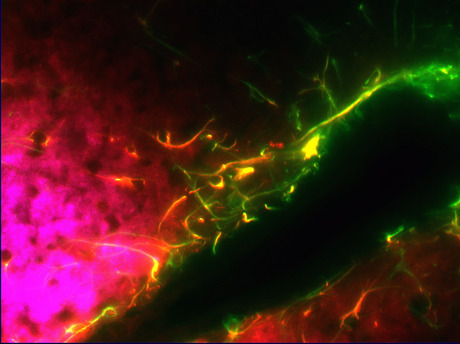Chronic pain treatment with stem cells

The Australian Research Council (ARC) has awarded a Linkage Grant of $340,000 to a research consortium investigating how stem cells can be used to relieve chronic pain.
The consortium brings together innovative cell labelling technologies developed by the ARC Centre of Excellence for Nanoscale BioPhotonics (CNBP) and a transdisciplinary team of researchers from Macquarie University, the University of Adelaide and regenerative medicine company Regeneus (ASX:RGS).
CNBP Director Professor Mark Hutchinson has previously demonstrated that neuropathic pain — pain caused by damage or disease affecting nerves — is controlled by our immune system. The good news, said Professor Hutchinson, is that stem cells secrete molecules that control or modulate the immune system.
“Because neuropathic pain is driven by the immune system, we can use stem cells to control and shut down the pain,” explained Professor Hutchinson, who is based at the University of Adelaide. “However, stem cells can secrete both good (anti-inflammatory) and bad (inflammatory) molecules; therefore, the use of cells that secrete the right molecules is going to be critical.”
With this in mind, CNBP Deputy Director Professor Ewa Goldys and her group at Macquarie University have developed cell labelling technologies to identify and select cells based on the molecules that they are secreting. This technology will be used for the manufacture of stem cells for the treatment of chronic pain.
“Our efforts will be largely based on utilising CNBP technology, incorporating innovative cell detection, molecular sensing and labelling know-how, operating at the nanoscale level,” Professor Goldys said.
The study will also build on Professor Hutchinson’s previous work which established that female chronic pain is more widespread than male pain. He noted, “Building on our ability to sense what is happening in the body at the cellular and molecular level, this project aims to develop a new understanding of pain as well as its differences related to gender.
“Establishing the fundamental mechanism in pain, the role of immune signalling and molecular mediators, we will enable true pain-modifying treatments which address pivotal trigger points in both females and males.”
Regeneus has patents and patent applications on the use of stem cells for the treatment of neuropathic pain and has had previous success with the use of stem cells for the treatment of neuropathic pain. The outcomes of the research project are expected to lead to the development of allogeneic off-the-shelf stem cell products that have been tailored for the treatment of neuropathic pain in both veterinary and human markets.
Personality influences the expression of our genes
An international research team has used artificial intelligence to show that our personalities...
Pig hearts kept alive outside the body for 24 hours
A major hurdle for human heart transplantation is the limited storage time of the donor heart...
Breakthrough antibiotic for mycobacterial infections
The antibiotic candidate, named COE-PNH2, has been optimised to target Mycobacterium...







